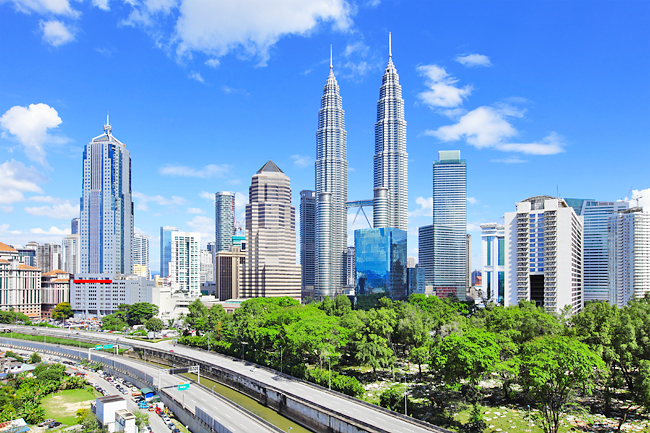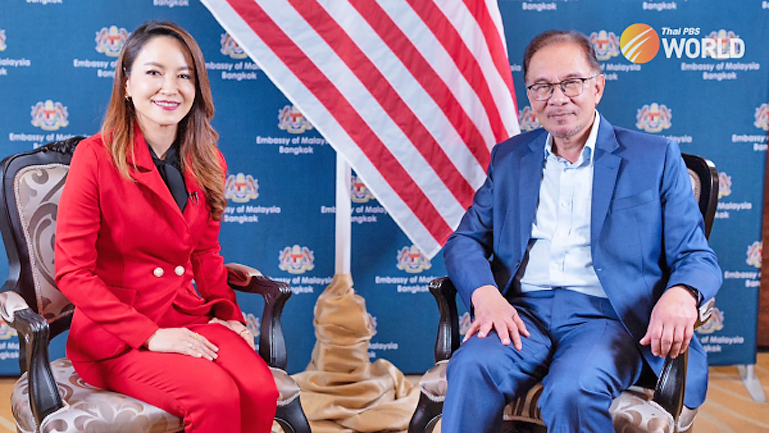ANN/THAI PBS WORLD – The 10th Prime Minister of Malaysia Dato Seri Anwar Ibrahim was on formal visit to Thailand. He discussed various issues, from the South of Thailand, economic cooperation between the two countries, ASEAN’s role in dealing with the Myanmar crisis to his fight against corruption in Malaysia.
PM Anwar Ibrahim talked to Nattha Komolvadhin in an exclusive interview with Thai PBS World. The conversation begins with how his life has changed since taking the office, after waiting for this post for more than 20 years.
BEING PRIME MINISTER
Q: Your Excellency Prime Minister Anwar Ibrahim, thank you very much for joining me. I have been waiting for more than 20 years to address you as Prime Minister. How has your life changed since becoming Prime Minister and when you were Prime Minister in waiting?
A: Well, if you have waited for too long, when you achieve that it just feels like normal. You have been thinking about it, you plan and I am comfortable, as I was before. So, nothing has really changed. My mannerisms, my contact, although the burden is of course something else, you have to deal with problems of the state and have to work really, really hard.
Q: Your premiership is approaching its 100 days, is it still a honeymoon period for you?
A: Not really, because from day one my colleagues got a clear message, we are all committed and we work very hard. We don’t have a clear timeframe of weeks or months or years. The point is, from day one, we have to set the parameters right, because we are talking about good governance, and leading the country out of corruption, which has become systemic and which means the challenge is serious and we have also some glimmers of racial tensions and religious animosity, which we have to deal with, but I believe the majority of Malaysians remain sane and understanding that we can stick to our beliefs but we have the country to preserve and secure.


THE SOUTH OF THAILAND
Q: You discussed (the situation in southern Thailand) with Prime Minister Prayuth Chan-O-Cha. It is highly expected your visit will lead to a peace process, can you tell me what you discussed with him?
A: I discussed with PM Prayuth and DPM Prawit the so-called issue in the South. We discussed it extensively, because it has been going on for decades. It is internal matter within Thailand, so we can come in only as facilitator when requested and I told PM Prayuth that, in a small way with your agreement, I will do whatever is necessary to talk to our friends in the South, engaging with them and engaging with those in Bangkok.
There is a trust deficit. Is it true that there is not going to be intimidation, is it true that there will be fairness for the different religions, cultures are to be protected. I believe it is true. It is not about what the government has said, but it has to come from their action.
We will have to ensure that the negotiations and meetings take place more often and some of the issues raised must be dealt with and addressed. But what cannot be considered or compromised is our position against any form of violence.
Q: Malaysia has appointed a new facilitator, can you do more on top of that?
A: Well, only one facilitator. A former army chief, who is a friend to many key generals here. That has helped immensely in the process of negotiation. We have a commitment between both Prime Ministers, both security agencies.
The issue of social and economic development is not really for South Thailand but also for North Malaysia, the Malay Peninsula. It is bilateral and also the triangle which involves part of Indonesia. I can’t say for now, but from the meeting, this is the most frank, most forthcoming and the commitment to proceed to ensure that there is a special sort of effort to enhance bilateral relations, border security, avoiding smuggling, trade, investment, joint development, cultural, education. It has been so positive and I am very encouraged.
Q: In the press conference, you said peace in the south of Thailand is paramount, by doing all means necessary, what do you mean by that?
A: We have to listen to them and listen to those in charge in Bangkok and the deal on this specific issue. Everyone talks about peace, everyone talks about justice, but you can listen to grievances and deal with it specifically, but again, on top of all these is social economic development. People will be busy, development busy with their jobs and at the same time their interests in minority groups, by religious group as part of the Thai context, is expected.
I told PM Prayuth that, in Malaysia we also have to make that departure. I don’t want any citizen be they Buddhist, Muslim, Christians or Hindu, to feel that they are marginalised in anyway. In my exchanges, not only with the DPM and ministers, I sense that there is a ray of hope, people want to develop our country, and therefore we want to have excellent relations with our neighbors. It is a common border, it is no joke.
Unfortunately, the border areas for us, for Malaysia, are relatively poor areas and the same with Thailand. Our common resolve is to uplift. There is a misunderstanding that it is the issue of the South of Thailand, I said it is also north of Malaysia and the Peninsula. So, if it is a joint effort, it will help.
ASEAN AND MYANMAR
Q: In addition to issue of southern Thailand, what else can the two countries do more to step up bilateral relations?
A: There is a problem in dealing with Myanmar, which is more problematic for Thailand because of common borders. You are dealing with the military junta that does not care about the plight of human rights, killings and rights of minorities. I told my Thai counterparts that we also have a problem because 200,000 refugees are in Malaysia. We can’t cope.
The solution is not to give them better housing, medical facilities. The solution is in Myanmar. It might be by solving military regime. We can’t see that the whole of ASEAN has no influence or say because, if we do give that signal, the Europeans, the Americans and the Chinese will claim their rights.
Q: You mean that you are a newcomer? Do you believe in your ability to convince other leaders? You met with the leaders of Brunei, Indonesia, Singapore and now Thailand. Can they be on the same page on Myanmar?
A: So far, we are getting closer. It is not for me to convince them, they share with me too. We are talking about four decades of a conflict, which does not seem likely to be resolved in the near future, unless ASEAN probably revises its strategy. That will have to be discussed.
Q: Do you still believe in the ASEAN way and constructive engagement?
A: Yes and no. There is also a strength in dialogue and negotiation, but the ASEAN way has been extremely productive in dealing with many other issues, negotiating, tolerance like that, but the ASEAN way needs to be revised when it comes to Myanmar, because constructive engagement has not been working.
Q: What’s your plan to revise it as a newcomer?
A: As a newcomer, I will have to listen to my other colleagues. I do acknowledge that there is a problem. Our previous attempt to resolve it does not seem to work, things have got worse. You can’t say it is (only) an internal problem of Myanmar because it is affecting us.
Affecting Thailand badly because of the borders, refugees are worse in Malaysia, refugees are affecting Indonesia. So, we will have to, as Indonesia is taking the lead.
Probably, in the next two to four weeks, I will talk to President Jokowi and give him my views on what has happened and seek his wisdom in formulating some new strategy.
Q: Do you still think ASEAN should stick with the five point consensus on the Myanmar crisis?
A: Well, the five-point consensus is surely the beginning.
Q: Will ASEAN have to stick to this path?
A: This path is not cast in stone, which means there should be a broad parameter that could expand. I will leave it for my wise foreign minister to work with his colleagues and advise us in return.
POLITICS IN MALAYSIA
Q: Dr Mahathir Mohamad said just recently that he could not figure out why he lost in the election, do you have an answer for him?
A: No, I think we should leave him alone. He has done his part, but he also committed many blunders and, for now, I think the country has to move on and, at the right time, they will even move on beyond Anwar. We have to accept this reality, the sooner myself, him or anybody accepts the fact that we have a role, but we have got to read the signals, when it is done, it is done.
Q: You brand your government as one of “national unity”, an unlikely coalition of PH and UMNO leading Barisan Nasional and other parties, what’s the main challenge for you as the conductor of this government?
A: We are living in post-normal time as you know, unanticipated. There is something developing, simultaneous, sometimes spontaneous and would require some ingenuity in resolving many problems. Now, look at Malaysia, where is the problem?
Political instability will kill the country politically and economically. For the last few years nothing seems to move, no policy, no direction and, because of that, leaders will take the chance to squander as much as possible.
So, we have been at loggerheads, sometimes viciously I think, between PH and the UMNO lead coalition of BN, but what was the consensus? That it is enough. We agree that we need stability. We agree that we need to chart a new future for the country. We agree on good governance and leading the country out of corruption and we agree that this is a country that is not racial.
A strong Malay-based (society) to address the Malays’ concerns, but to be able to embrace and include all races, this is the parameter on which we agree and the strong coalition and partners in Saba and Sarawak will form a very formidable alliance with a two thirds majority, which makes Malaysia one of the most stable countries in ASEAN.
Q: What are the risks that you can see in the near future?
A: No reason to disbelieve this, there is no real risk. Of course, there are some desperate voices that we will lose in three months, in six months, we buy this and buy that. I don’t see that it is a problem right now.
Q: With the issue of corruption, people must be wondering how you will deal with the deputy prime minister, because he faces many charges of corruption.
A: So far, to give him credit, he has not interfered in the process. We have to watch the process. He never asks me to withdraw the case. The point is that good governance is the agenda, he has to go through the process.








